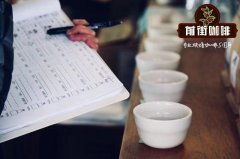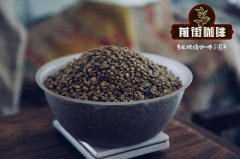Full-sun coffee producing country Yemeni coffee cultivation situation is Yemeni coffee high price Yemeni coffee is the most expensive

Professional coffee knowledge exchange more coffee bean information please follow the coffee workshop (Wechat official account cafe_style)
Yemeni coffee beans _ mocha coffee beans _ Yemeni mocha coffee beans
Each country's history records its own culture and craftsmanship. For example, Japanese paper, Indian silk and Persian carpets. When it comes to Yemen, the most representative is coffee. Nothing in Yemen highlights the uniqueness of the country more than the unique history of the coffee trade and ancestral coffee-growing techniques.
Last week we explored that coffee originated in Ethiopia, but at the same time, Ethiopia's neighbor, Yemen, was also growing drinking coffee.
Yemen: recalcitrant wild incense
Yemen is a classic of the ancient morning taste of the sun, and it is also the only producer of full-time coffee in the world. the traditional treatment of dripping water is illegal, and it has not changed since Europe became infatuated with game mocha in the 17th century. This is related to the extremely dry climate in Shumen, where coffee is mainly grown in the central highlands, with an average annual rainfall of only 400 Mel 750 mm, far less than the best rainfall of 1500 Mel 2000 mm in Arabica. Fortunately, the Yemeni coffee gene comes from the drought-tolerant Hara variety in Ethiopia, but the lack of water has made it impossible for farmers to introduce more advanced washing methods, and the wild flavor is better than Hara coffee, so Yemen has become the best choice to experience the ancient early taste. Yemen is the first stop for Arabica to transplant from Ethiopia. Although its genetic polymorphism has been reduced, it still retains a considerable diversity of coffee genes, making it the second country in the world to qualify as an ancient superior variety.
Game likes and dislikes both poles
Yemeni coffee is controversial, wild and difficult game, lovers praise the sky, hate jealousy, can be classified as an Acquired taste, need to learn and try, can develop hobbies. The game in Yemen is stronger than that in Ethiopia. When grinding beans, you can smell an indescribable "strange fragrance". Lovers are called fermented wild incense, while those who hate it are dismissed as chicken shit or durian. Likes and dislikes vary from person to person. This is the psychological preparation for appreciating the early taste of ancient times.
The sun treatment of Yemeni farmers is rougher than that of Ethiopia, and the coffee fruit is not picked until it dries on the branches and turns purple-black and falls to the ground to pick it up. This is different from the exquisite sun in which Ye Jia Xuefei or Sidamo picks red fruit and lays it on the "elevated net bed", which is the main reason for the heavy game in Yemen.
Four producing areas of Qifang and Yixiang
Snal, WMatar, Ismali and Hrai are the four famous producing areas in the central highlands of Yemen, which are very popular in the boutique coffee industry in Europe and the United States.
When Nali collects the first and produces the coffee in the daily food place where the coffee is made, it has the advantages of nearest distance, convenient transportation, mixed freshness and bright sour taste. Matali production area is located in the highlands on the west side of the capital, at an altitude of 2000,000Mel 2400 meters above sea level, which is the highest in Yemen, but the location is the most remote and the transportation is inconvenient. Farmers often have to wait for a period of time after harvest before they can be transported out. It is common to treasure coffee fruits for more than a year or even years, so they are not as fresh as Shanali. Matali's altitude is higher, if you can buy fresh goods, the acidity is bright and strong, game is less obvious; if you buy old goods, the sour taste will be dull, or even pulp smell.
To the southwest of Matali Heights are Ismali and Shirazi, both of which belong to the same producing area. The higher variety is Ismali and the lower is Shirazi. Basically, the beans of Shanali, Matali and Ismali are thinner and even smaller than those of Central and South America. Use a direct-fire roaster with holes or an electric Hottop Roaster to beware of coffee beans falling out of the holes. Xilazi granule is larger than this problem, but the quality is obviously poor, often with the smell of rotten wood.
Yemeni coffee is rich in wild fragrance and poor cleanliness, but carefully sipping it should be able to drink the strange fragrance behind game, which is very interesting. The highlands of central Yemen are hilly and rugged. Most small farmers use the planting method of breaking up into parts. Several plants are planted on steep slopes and dozens of plants are planted on terraces or cliffs, each with different soil and water and micro-climate, so the fragrance composition is also different. In other words, a cup of Yemeni coffee consists of many different "regional flavors".
The composition of coffee beans may not be the same in each cup and the length of time for small farmers to store sun-dried beans is different. Do not expect 100 beans in each batch to be as good as one. Therefore, to appreciate Yemeni coffee, you must first be tolerant and generous. Yemen is by no means the first choice for you to work with Haofang, but it is the wonderful bean in the world that you want to taste together with those who "know the fragrance".
What is mocha coffee? Yemeni mocha-Matali sun beans are the real mocha coffee beans in Yemen
Important Notice :
前街咖啡 FrontStreet Coffee has moved to new addredd:
FrontStreet Coffee Address: 315,Donghua East Road,GuangZhou
Tel:020 38364473
- Prev

Yemeni mocha Matari Matali test cup test report introduction to the flavor of Yemeni coffee cups
Professional coffee knowledge exchange more coffee bean information please follow the coffee workshop (Wechat official account cafe_style) Yemeni coffee beans _ mocha coffee beans Yemeni mocha coffee beans come here! Here comes the hot report, so that you know what kind of tonality he is without drinking it. "Matari (Yemen) Matali baking cup test report: if you are interested, take a reference.
- Next

The opening of the third Yunnan Coffee Raw Bean Competition Global judges gathered in Pu'er to look for good coffee in Yunnan.
Professional coffee knowledge exchange more coffee bean information please follow the coffee workshop (Wechat official account cafe_style) Yunnan Coffee China Yunnan small fine coffee beans Yunnan coffee bean prices the third Yunnan Coffee Raw Bean Competition opened in Pu'er City, Yunnan Province on the 9th. 123 beans from five major coffee producing areas in Yunnan will be accepted by judges from China, the United States, Malaysia, Australia and other countries.
Related
- Detailed explanation of Jadeite planting Land in Panamanian Jadeite Manor introduction to the grading system of Jadeite competitive bidding, Red bid, Green bid and Rose Summer
- Story of Coffee planting in Brenka region of Costa Rica Stonehenge Manor anaerobic heavy honey treatment of flavor mouth
- What's on the barrel of Blue Mountain Coffee beans?
- Can American coffee also pull flowers? How to use hot American style to pull out a good-looking pattern?
- Can you make a cold extract with coffee beans? What is the right proportion for cold-extracted coffee formula?
- Indonesian PWN Gold Mandrine Coffee Origin Features Flavor How to Chong? Mandolin coffee is American.
- A brief introduction to the flavor characteristics of Brazilian yellow bourbon coffee beans
- What is the effect of different water quality on the flavor of cold-extracted coffee? What kind of water is best for brewing coffee?
- Why do you think of Rose Summer whenever you mention Panamanian coffee?
- Introduction to the characteristics of authentic blue mountain coffee bean producing areas? What is the CIB Coffee Authority in Jamaica?

